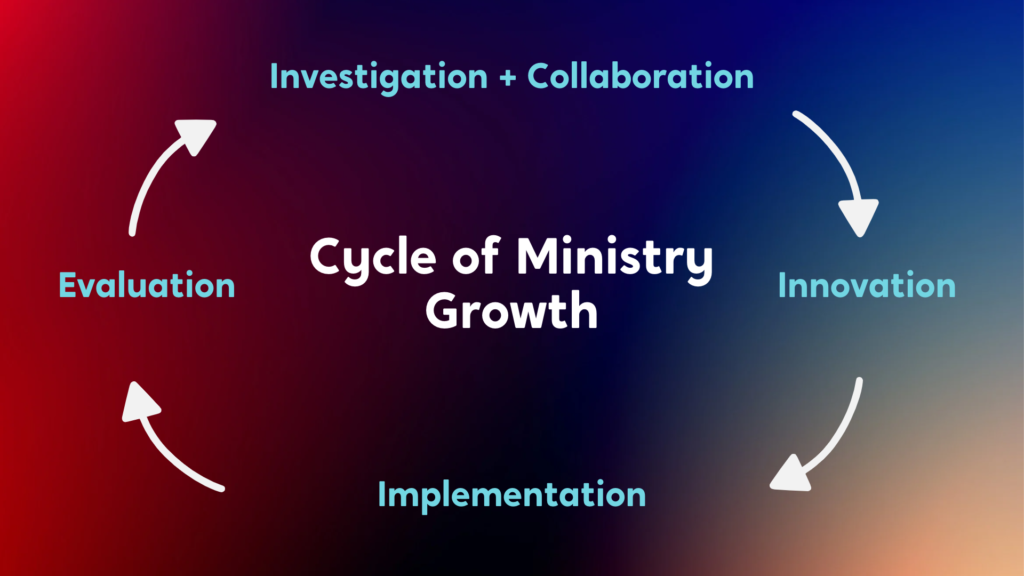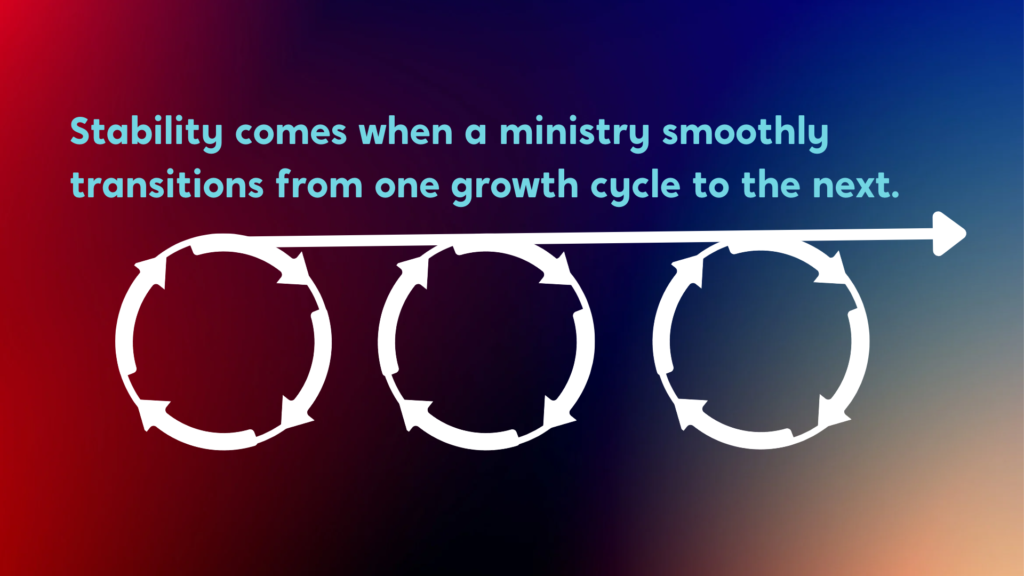This is a guest post by Hunter Williams with Awana.
Every leader wants two things for their ministry: growth and stability.
They want the ministries they lead to increase their impact and remain stable amid adversity.
Understanding what brings these goals about is both easy and elusive.
It’s easy because we know that the stability of any ministry is founded on the solid rock of God’s unfailing word and is grown through the Spirit’s life-changing work.
It’s also elusive because it doesn’t come by sitting idly and doing nothing.
The Spirit of God works through the word of God.
He also works through the people of God, which means that stability and growth come through our planning, energy, and work.
The elusiveness is in the details.
What plans, actions, and strategies lead to the strongest ministries?
Is there a specific formula, or is it unique to each person and church?
The more questions we ask, the more elusive the answer becomes.

Understanding the Process
Ministries can experience exponential growth but not have an adequate understanding of the components that led to it.
They might attribute the growth to surface-level changes but remain unaware of the underlying factors that made them fruitful.
Similarly, a ministry can have a history of health and stability but not understand the root cause of its resilience.
They might recognize elements that contributed to it but lack a firm grasp of its source.
For many, growth is a shot in the dark achieved as leaders throw various options in the air until something sticks.
Likewise, stability is often a welcomed side effect of hard work that leaders overlook until the going gets tough.
Achieving stability and growth is wonderful, but understanding how you obtain stability and growth is even better.
If leaders want thriving ministries that last, they need a way to understand how God works through their efforts and recognize when their plans aren’t working.
A process that trusts the unchanging nature of God’s promises and recognizes the ever-changing nature of circumstances and culture is needed.
What does such a process look like?
Growth is a Cycle
Growth happens in cycles.
What once led to incredible growth in a specific place or season may not yield the same results in another.
Stability comes when a ministry smoothly transitions from one growth cycle to the next.
Leaders must know the inner workings of the cycle for these transitions to occur.
Below is a sketch of the ministry cycle of growth.
Each element helps leaders understand when decisions are leading to fruitful change and when they are minimizing impact.
To be clear, this isn’t a one-and-done process, instead, it’s a cycle leaders must work through continually.
With this in mind, let’s unpack each step of the cycle and see how it can inform a leader’s decision-making and approaches to change.

1.) Investigation + Collaboration
In this step, a leader takes the posture of a learner. All notions of mastery are put to the side, and a humble acceptance of finitude is taken up.
In this step, leaders and their teams focus on inquiring insight to gain clarity and inform direction.
Investigation can come from a variety of sources.
It might include observing the character and responses of those being led, having honest conversations with other ministry leaders, reading books and articles, listening to podcasts, attending conferences, or taking surveys.
The more avenues leaders take during the investigation stage, the more likely they are to gain insight and notice trends.
Initially, this step was just called “investigation,” but collaboration was added because investigation done in isolation has significant limitations.
A leader can do an enormous amount of research, but research alone isn’t helpful.
For investigation to be meaningful, it has to be interpreted.
Otherwise, it’s nothing more than a collection of random facts.
When ministry leaders do all the investigation without collaborating with their team members, their interpretive field is limited.
A leader might gain insight through personal study, but when research is done and discussed with others, it can lead to discoveries that would have otherwise been missed.
On the flip side, if a ministry has times of collaboration without investigation, it can lead to deception.
A conversation is great, but if that conversation isn’t informed by research, it will ultimately be shallow, subjective, and self-serving.
Without new insights, the collaboration taking place isn’t based in reality, making it easier to create excuses or delusions.
For a ministry to see how it’s doing and understand the context in which it is serving, it needs every leader and volunteer invested in the process of thorough investigation and honest collaboration.
2.) Innovation
Innovation is a harsh word for some.
It conjures ideas of radical change and new technology.
While innovation might include some of these shifts, it’s not always necessary.
Innovation is simply the appropriate application of investigation.
Sometimes, innovation doesn’t require adding something new but adjusting something already in existence.
After investigation, a leadership team may not see a need to add anything but merely tweak how they accomplish certain aspects of their ministry.
After a group has gone through a period of intentional research and gleaned critical insights within their church and community, they can turn that insight into innovation.
Innovation can also come by subtraction.
Instead of adding a new position, program, or practice, a team’s investigation might lead to removing certain functions, projects, or procedures deemed unnecessary or detrimental to their ministry.
The right innovation is a result of the diligent effort given in the first step of the cycle, so don’t shortchange it.
A ministry’s innovation is only as good as its investigation and collaboration.
3.) Implementation
After a team has determined what type of innovation is needed, the next step is to map out its implementation.
What does implementation look like?
It all depends on the innovation.
Its size and scope will determine how long it will take to be properly implemented.
For example, if something new is being developed, a longer runway might be needed to plan, prep, communicate and answer questions regarding the change.
A longer runway might be unnecessary if something is simply adjusted.
If something is being removed, extra time might be given to ensure everyone understands the reasons behind the removal and sees the benefits it will bring to the ministry.
The most outstanding innovation can fail if it isn’t correctly implemented.
Too much change too soon can lead to frustration, and minor modifications stretched over a long period of time can lead to impatience.
Prayer, collaboration, and testing are needed to guarantee a successful implementation.
4.) Evaluation
The importance of this last step cannot be overstated.
It’s essential to growth and stability but is the most commonly skipped step in the cycle.
Leaders often avoid evaluation because they are scared of what they might find on the other side.
No one likes to have shortcomings pointed out, so ministries keep running while pain points are swept under the rug.
However, if a church is to excel and remain fruitful, it must evaluate itself honestly and consistently.
After an innovation has been implemented, leaders should set a time to evaluate it.
The type of innovation will determine how long it needs to run before an assessment can be made.
If a new position or program has been created, it might take a year or two before it can be thoroughly evaluated.
If a simple adjustment has been made, less time is needed to see it at work before judgments are formed.
Whatever the case, all forms of evaluation are made in light of a ministry’s vision.
If the changes put into place aren’t making strides toward fulfilling the vision, then it needs to be tweaked or removed altogether to make room for innovation that does.
Even if an implemented change has been evaluated and found fruitful, it doesn’t mean that evaluation is done for good.
Different aspects of a ministry should be evaluated every week, month, or year depending on the element being evaluated.
Once an evaluation is completed in a given cycle, another cycle begins.
The results of an evaluation will determine how you re-enter the cycle.
If the assessment is good, you will jump back into the investigation phase, looking for ways to improve the changes.
If the evaluation is poor, you will restart the cycle by investigating what changes need to be made to better fit the needs and gaps you are experiencing.
Good vs. Best
Ministries may grow for a time, but they often die or lose stability because they are unwilling to re-enter the cycle.
Sustainable ministries don’t just go through the cycle; they live in it.
They’re always investigating, innovating, implementing, and evaluating their work.
They aren’t content with what’s good but desire what’s best.
They seek to glorify God by being the best stewards of the knowledge and gifts they’ve been given.
May your ministry experience growth and stability as you work through the steps of this cycle in your ministry.

About Hunter
Hunter is a missionary with Awana and has served in various ministry roles, including as pastor, youth pastor, and chaplain. As a child discipleship advocate, Hunter seeks to elevate the quality of discipleship children receive in the church and the home. He graduated from Moody Bible Institute with a B.A. in Biblical and Theological studies and is currently working on his MDiv through Southeastern Baptist Theological Seminary. He loves connecting with people, trying new things, reading, and going on adventures with his family.






